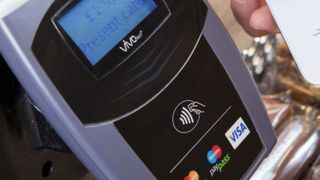The future of contactless payments may be in your retina, heart beat and veins
You won't be saying goodbye to the £20 cap yet though

Contactless payments are great - paying with a tap of your bankcard or smartphone certainly feels futuristic and it does speed up the payment process.
In fact we're quite partial to a quick tap in the UK with contactless transactions in October 2014 up 352% compared to the same period in 2013, according to Mastercard's latest statistics.
There is a sticking point though. That £20 transaction cap.
It's not hard to understand why the cap is in place - contactless payments do not require you to sign or enter a pin, so theoretically anyone could use your card to pay for goods.
The £20 cap at least ensures if you're the victim of theft, the criminal won't be able to rack up a huge bill via contactless payments before you've informed your card issuer.
Who are ya?
The cap does limit the effectiveness of the fledging technology, but card companies are hard at work building identifiers into cards so they know it's you using them at point of sale.
TechRadar spoke to Scott Abrahams, Mastercard's Group Head of Acceptance and Emerging Payments, who explained the firm is trialling a number of ways of indentifying users with a card.
Get daily insight, inspiration and deals in your inbox
Get the hottest deals available in your inbox plus news, reviews, opinion, analysis and more from the TechRadar team.
"The [£20 transaction] cap is agreed across the UK between us, our partners and other card provides," Abrahams told us.

"We continue to work with everyone to see where [this £20 cap] can be increased. A limitless contactless transaction depends on us being able to make sure the user of the technology is the person it should be."
Mastercard has recently launched the first European biometric card trial in Norway and Poland, with cards featuring a built in finger vein sensor allowing it to verify the person using it.
The finger vein sensor is a progression of the fingerprint scanner we're seeing in the likes of the iPhone 6 and Samsung Galaxy S5, adding in an additional layer of security to the scanning process.
Indentify yourself
That's not the only tech that's being trialled, as Abrahams explained. "That's just one way of validating the card user.
"We're trialling all sorts of other things. For example in Canada we've looked at heartbeat recognition, while in South Africa we've trialled retinal scanners."
All this technology is still very much in the trial phase, so don't think the next card your bank sends you will sport any of this identifying tech.
Of course this brings up a point of whether or not you want your bank to monitor your biometric details at all, but as mobile phones continue to gain features such as face recognition, fingerprint scanners and heart rate monitors it's only a matter of time before it percolates down to our payment systems.

John joined TechRadar over a decade ago as Staff Writer for Phones, and over the years has built up a vast knowledge of the tech industry. He's interviewed CEOs from some of the world's biggest tech firms, visited their HQs and has appeared on live TV and radio, including Sky News, BBC News, BBC World News, Al Jazeera, LBC and BBC Radio 4. Originally specializing in phones, tablets and wearables, John is now TechRadar's resident automotive expert, reviewing the latest and greatest EVs and PHEVs on the market. John also looks after the day-to-day running of the site.
Most Popular


